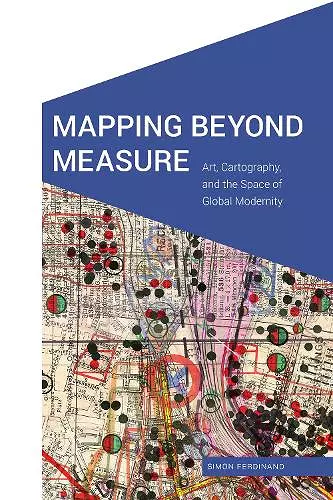Mapping Beyond Measure
Art, Cartography, and the Space of Global Modernity
Format:Paperback
Publisher:University of Nebraska Press
Published:1st Dec '19
Should be back in stock very soon

This book examines various map-based artworks, challenging the traditional view of space as merely measurable and highlighting the political implications of map art.
In Mapping Beyond Measure, Simon Ferdinand explores a variety of map-based artistic expressions, including painting, collage, film, walking performances, and digital drawing. These works originate from diverse locations such as Britain, Japan, the Netherlands, Ukraine, the United States, and the former Soviet Union. Ferdinand argues that these artistic creations collectively challenge the prevailing modern perception of the world as a quantifiable and manipulable geometric space. This examination reveals the intricate relationship between aesthetics and power, and how these artworks navigate the boundaries between truth and artifice.
Over the past century, an increasing number of visual artists have become fascinated by the complex interplay of beauty and authority within geographical mapmaking. This burgeoning field of “map art” has gained prominence, yet critical discourse surrounding it has largely remained superficial. In Mapping Beyond Measure, Ferdinand breaks new ground by conducting in-depth analyses of significant map artworks while engaging with spatial theorists like Peter Sloterdijk, Zygmunt Bauman, and Michel de Certeau. This dialogue highlights how map art interrogates the foundational myths and narratives that have historically shaped modern spatial understanding.
Through his detailed readings, Ferdinand not only underscores the political implications of these artistic practices but also emphasizes the unique contributions of map art in the context of contemporary shifts toward digital mapping. Ultimately, Mapping Beyond Measure positions map art as a crucial lens through which to reconsider the relationships between space, power, and representation in today's world.
"Thought-provoking . . . . Ferdinand impressively traverses a variety of interdisciplinary approaches from cartography, sociology, political and philosophical theory, as well as art analysis; one hopes he can expand this work into more publishing and even exhibitions. . . . Necessary reading for anyone concerned with the contemporary nexus of art and mapping."—Ruth Watson, Visual Studies
"Ferdinand's argument that art can help reveal both the potency and the spectrality of modern cartography’s claims to knowledge, at once tearing them down whilst also relying on them . . . is a powerful one, which offers an original, and compelling, contribution to ongoing geographical debates around mapping."—Dave McLaughlin, Social and Cultural Geography
"Deep and wonderful . . . The author does superb work in analyzing art and cartography. . . . I recommend this book for a museum curator, an art historian, an artist or a person with a serious interest in art and/or cartography, and a mapmaker."—Lucia Lovison-Golob, Western Association of Map Libraries Bulletin
"Mapping Beyond Measure participates in a broader scholarly discussion about the cultural formation of geographic knowledge and the ways that we think about and experience our place in the world through maps and other cultural representations of the earth. The book also provides a valuable resource for a growing number of historians who use digital mapping as a method of inquiry."—Kristan M. Hanson, H-Maps
“In this thoughtful analysis of ‘map art’ Simon Ferdinand offers an innovative interpretation of contemporary artworks that tests and reconfigures the challenges and opportunities posed by the transformation in global modernity of our lived world into lines and grids. ‘I map, therefore I am modern’ is the resounding implication that emerges from Ferdinand’s perceptive exploration of how visual artists in our times have used the map form to relate to the world, to the globe, indeed to earth itself.”—Sumathi Ramaswamy, author of Terrestrial Lessons: The Conquest of the World as Globe
“This is an important book on a theoretical level. By looking at recent technologies as a continuation of existing ontologies, Ferdinand goes beyond the hype around digital mapping. The chapters touch deftly on many themes that will also be of interest to academic readers who don’t deal explicitly with maps in their work, including utopia, modernity, quantification, and futurism, among many others.”—Jess Bier, author of Mapping Israel, Mapping Palestine: How Occupied Landscapes Shape Scientific Knowledge
ISBN: 9781496217585
Dimensions: unknown
Weight: unknown
360 pages